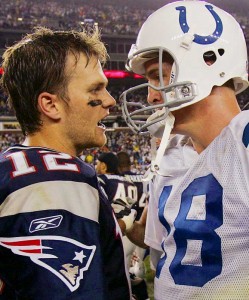As a law student, I spend most of my week reading, researching and writing about the law. I chose this path because I truly enjoy it; however, sometimes it gets old. I’m not always in the mood for it and need a distraction—something totally unrelated. ESPN is my safe area where I don’t have to worry about torts, contracts or procedures. I can simply zone out and enjoy slam dunks, home runs and touchdowns.
About a week ago, ESPN reporters had the audacity to mention a word that belongs in the classroom, not my living room. This dirty word is “antitrust.”
After a round of failed negotiation for a new collective bargaining agreement, several NFL players and one draft prospect filed an antitrust suit against the NFL. All of a sudden, my worlds collided. My favorite distraction was polluted with the legal jargon I spend most of my time sorting through.
One of beautiful things about football is its ability to transcend age, education and cultural background. I can sit at sports bar and chitchat with people from all walks of life about the game. There is something amazing and reassuring about that to me. Now everyone bombards me with questions about the lockout when they find out I’m in law school. My worlds are slowly melting into one.
People care about football and reporters do a lousy job of informing the fans what this legal action is all about. Everyone assumes it is over greed, but I wouldn’t be so quick to oversimplify this problem. Because I’m frequently asked about the NFL’s current legal woes, I thought I’d type up some basics to let the average sports fan know what exactly an antitrust suit is.
What’s Collective Bargaining Agreement? Why is there a lockout? What’s decertification?
Collective bargaining is a process of negotiation between employees and employers that regulates work conditions. Typically, a labor union negotiates with the employer and the terms of the negotiation go into a contract called a collective bargaining agreement (CBA). In the NFL scenario, the CBA has expired, which opens up the player’s right to file an antitrust suit.
The owners want a new CBA for stability. Without a new labor agreement, the teams could go on strike at anytime. Imagine the financial disaster if the players went on strike two weeks before the Super Bowl. To prevent this disaster, the owners have locked out the players at a time when their bargaining power is at its weakest—the offseason.
Now that the players are locked out, they have filed an antitrust lawsuit. The player’s union, the NFLPA, can’t file an antitrust lawsuit, but an individual can. Thus, the NFLPA has decertified to allow the players their individual rights to sue the NFL. This is why the complaint names individual players as the plaintiffs. Tom Brady, Drew Brees, Vincent Jackson, Ben Leber, Logan Mankins, Peyton Manning, Von Miller, Brian Robinson, Osi Umenyiora and Mike Vrabel are suing the NFL in their individual capacity and on the behalf of all the league’s players.
Von Miller plays a specifically interesting role in the filing. He is a linebacker out of Texas A&M entering the 2011 NFL draft. His presence is significant because it allows the plaintiffs to challenge the legality of the draft. I will elaborate more on this in a moment.
What does Antitrust mean?
In 1890, Congress passed the Sherman Antitrust Act. The Act was named after its principle author, Senator John Sherman of Ohio. During this era, monopolists exploited consumers by colluding with each other to restrict production and raise prices. The Act aims to prevent businesses from defrauding consumers and is not concerned with business dominating an industry by providing a superior product.
Let’s consider a hypothetical to demonstrate what the Act prevents. Suppose all the gas station owners in your town had a meeting and decided how much gas should cost. Currently, gas costs about $3 a gallon. The owners all sell about 10,000 gallons a week and make about $30,000. After crunching the numbers, they figure out that some people will still buy gas at $6 a gallon. In this model, each station will only sell about 6,000 gallons per week and make an enhanced profit of $36,000. To institute this program, all the gas stations must keep the same price or a cheaper station will attract the entire gas buying market.
The Sherman Act makes this sort of concerted activity illegal. By setting the price of gas at $6 a gallon, the owners are defrauding consumers and providing less gas. Fewer people are driving to stores to spend money. This system isn’t good for the economy. Antitrust is a regulation that promotes competition. It stems from the idea that competitive businesses will try to outdo each other by offering better prices, products, and services. Competition creates incentive for research and innovation that leads to new technology and discovery.
How does this apply to football?
The Sherman Act makes every contract, combination or conspiracy that unreasonably restrains trade illegal. What is an “unreasonable restraint of trade” is up for some debate. Some things are always considered illegal, such as price fixing between companies and boycotts designed to push another business out of the market. In less clear-cut cases, courts apply the “Rule of Reason” test. Under this analysis, the court compares the alleged restraint in trade’s pro-competitive benefits with anti-competitive effects. If there is a less restrictive means of implementing the policy, then the policy is considered a violation.
The NFL players claim that the NFL is a monopoly because it’s the only professional football league in the country. The NFL and its 32 separately owned and independently run teams conspire to eliminate competition among themselves for players through the league’s rules and policies. The lockout itself is a violation of the Act because it denies the players the ability to market their talents and hopes to coerce them into an unfair labor agreement.
Another league institution is a restraint on trade, like the draft and franchise tag. The draft is a conspiracy amongst the teams on how to allocate talent, which denies each player the ability to sell his service to the highest bidder. The franchise tag unfairly forces players to stay on a team when he desires to leave.
You may be wondering why the players are suing over the draft and franchise tag now. These policies have been around for years. The answer is that the players agreed to these policies under the former CBA. Now that it doesn’t exist, players can challenge these policies under antitrust law.
In response to these claims, the owners will argue that the NFL is a single entertainment entity within a huge marketplace. In this view, the NFL isn’t simply a sports league, but another provider of programming that has to compete with other sports, television, film and the Internet for advertising revenue. It’s not the Cowboys vs. the Colts, but the Cowboys/Colts game vs. TrueBlood, the Grammys and Charlie Sheen’s Twitter.
To up the league’s value, the NFL needs the maximum amount of interest. Procedures like the draft and salary cap promote competition on the field by leveling each team’s access to talent. If the NFL didn’t strictly enforce these rules, then talent would go to whichever teams made the most money. This would probably result in Jerry Jones becoming George Steinbrenner. Smaller market teams would be at a significant disadvantage and fans would lose interest as they accepted their team’s mediocrity. The NFL wants every team’s fans engaged because the league makes more money when everyone is paying attention.
Additionally, the owner’s will argue that they don’t have a monopoly over professional football because anyone can start a league. To the owners, their alleged illegal conduct is what makes their product strong enough to outlive other leagues like the USFL and XFL. In this view, the lack of another league is because the owners have created a product so strong, competitors are deterred from entering the market. In the owners’ view, they are being penalized for being successful.
I think both sides have strong arguments. The question boils down to if the league’s policies create enough competitive benefits to warrant the restriction on the player’s mobility. Just like football, law is a game of inches. In close cases, the winner is usually the lawyer who makes the fewest mistakes and consistently has strong reasons for his or her claims.














Whats up people of the Pulse? MR. J Ryan Johnson, well you did a good job explaining the lockout, but for me it lacked a few things. It was full of knowledge, and facts that im sure you did your homework on. For me it was just stating the obvious that people have been going over for the past year….. All i know is i did read the whole article, i did gain some knowledge from it, and got a diffrent point of view on the lockout that i pray doesnt actually go down….. But as a dedicated reader to the Train Daddy, i havent missed a single article over the past years…. I need that comedy, that witty humor and the Train Daddy is some kind of special when it comes to writing on the sports world….. WE WILL PROTEST,,,,,,, Bring back the Train Daddy or you will lose my support, i love the pulse…. And the Train Daddy is the heartbeat when it comes to sports….. Bring him back or its on like donkey kong!!!!!!
Comment April 12, 2011 @ 6:25 pm